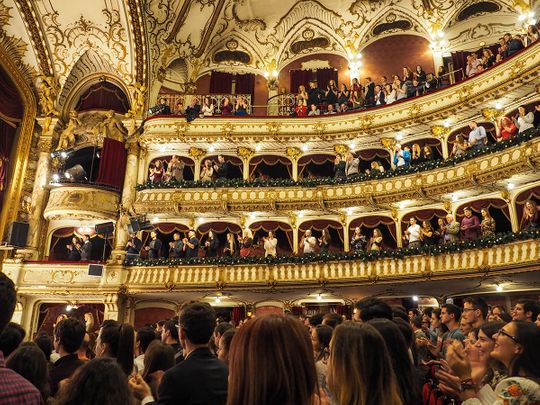
The Italian word “opera” means “work”, and it couldn’t be truer.
Click start to play today’s Word Search, where you can find music-related vocabulary.
When thinking of the opera, you might think of a woman or soprano on stage, singing in a foreign language (and if the only information you know about opera is from movies and animated films, perhaps you'd imagine the soprano reaching a pitch that breaks glass). But the opera is more than just theatrics - it's an incredible performance art, and its meaning is accurate – it is a lot of work.
How do you throw your voice to an entire theatre, while keeping it melodious and not resort to shouting? Ask an opera singer. The Italian art form tells a story through music and song, but unlike musicals, opera singers do not use microphones to amplify their voices – they rely solely on the power and pitch of their voice. Opera singers are also masters of resonance. They find their balance between three in-body resonators – nasal, pharyngeal and oral cavities – and learn to use their bodies as amplifiers through acquired vocal techniques.
The music you hear at the opera, too, is never pre-recorded; it’s played by an orchestra and is completely live. How big the orchestra is, depends on the kind of opera being staged and the complexity of the music. For instance, there’s a large difference in numbers when you compare two German composers: George Handel’s operas use a smaller orchestra of about 50 musicians, whereas Richard Wagner’s operas can necessitate up to 120 instrument players.
Before the 19th century, conductors weren’t a common sight in the staging of an opera. The orchestra used to be significantly smaller than what you see today. It wasn’t until German composer Ludwig van Beethoven appeared on the scene in the early 1800s that the orchestra grew by 50 per cent, according to the English National Opera website. Musical scores became so complex that a single musician could no longer keep the ensemble together – hence the need for a conductor to smoothly direct the entire orchestra.
But why are most librettos (the text sung in an opera) in Italian? History has a lot to do with it. The first ever public opera house opened in Venice, Italy, in 1637 – the Teatro San Cassiano. It transformed the city into Europe’s opera destination. As opera’s popularity grew, composers wanted to include more songs to please the audience, in a language that they understood. It’s why many opera masterpieces, like Wolfgang Mozart’s The Marriage of Figaro (Le Nozze di Figaro), was written in Italian (although he was Austrian).
Today, the world’s greatest opera houses, like the Dubai Opera, Sydney’s Opera House and the London Coliseum, have been designed specifically to elevate the performances of the singers and musicians on a grand scale. It's worth dressing up for, and experiencing, even if you don't know much about opera. You never know, the magical ambience of the opera house and the incredible talent on stage might make you a fan!
Have you been to the opera? Play today’s Word Search and let us know at games@gulfnews.com.








